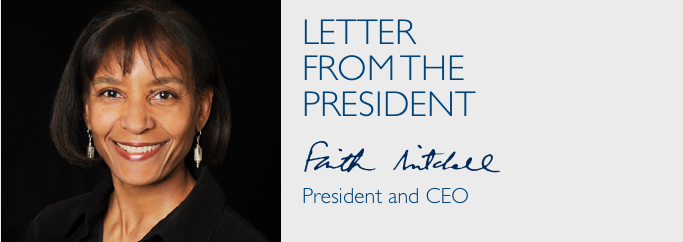
The annual conference showed again this year why it is the premier opportunity for health funders to talk to their peers about challenges, lessons learned, and the path forward. Thinking of Judy Belk, Diane Rowland, and Wade Crowfoot’s plenary speeches in particular, each one powerfully illustrated the achievements of philanthropy—whether in acting courageously and focusing on justice, increasing health care access and coverage options, or improving water access and quality. They also clearly outlined what funders can do next to support better health for American families and communities. (If you missed a plenary, or would like to refresh the experience, we will be posting the podcasts shortly.)
As part of our 35th anniversary celebration, we reached out to GIH board members, past and present, for their insights about the road ahead for health philanthropy. Like the plenary speakers, they are proud of the sector’s legacy. They also share a strong belief in health funders’ ongoing leadership locally, statewide, and nationally. Margaret O’Bryon, former President and CEO of the Consumer Health Foundation in Washington, DC summed it up beautifully: “Health funders have always been the leaders in the foundation field, so I have great hope and respect for the work they will continue to do to promote and insure the health of individuals, families, and communities.”
Several board members and alumni pointed out the contributions health funders have made—and can continue making—to policy change. Susan Zepeda, former President and CEO of the Foundation for a Healthy Kentucky, advised funders to continue supporting effective policy change work at state and local levels, to create environments that support healthy behaviors and to assure access to affordable, quality health care. Paul Jellinek urged funders to hold policymakers at all levels accountable for the impact of their policies on the health and health care of Americans.
Applauding funders’ past focus on state and national policy efforts, Karen Voci, President and CEO of the Harvard Pilgrim Foundation, is focusing her current work in the Northeast on wins that can be accomplished at very local levels while not losing sight of opportunities for common impact and progressive policies. “We have supported relatively small food-focused programs and organizations [and are struck by] their capacity to bring very disparate groups together and create social capital…We have been blown away by the volunteer energy in this space and the commitment to the democratic and human values that seem to be missing in the America we see on the news. We think this is a very powerful place for health philanthropy to be.”
Like Karen, Crystal Hayling, former President and CEO of the Blue Shield of California Foundation, sees opportunity for health philanthropy in food, which is “central to our culture, our health, and our communities.” Global work on large-scale food production and local, bottom-up efforts to produce local, nutritious foods that contribute to community building and economic development are “possible and essential.”
Throughout the rest of the year, I will share insights and recommendations from GIH Board members and alumni. I hope you will join me in these upcoming discussions about workforce education and clinical care, the social determinants of health, health equity, and health funders as social justice leaders.

